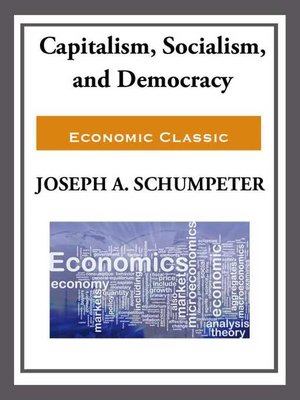

Schumpeter's analysis has proved of lasting impact, and has garnered the respect and attention of those involved in economic policy.

He warned that capitalism holds the seeds of its own destruction, and that government control over the economy carries the danger of out of control inflation and economic disaster, both due to the self-centered nature of human beings. In fact, he viewed the economy as somewhat like a living organism, constantly growing and changing to maintain its health. He coined the term "creative destruction" to describe this process of the old being constantly replaced by the new.

Schumpeter's view of economic health was radically different from that of Keynes, regarding innovation by entrepreneurs and investment into the development of new technologies as the essence of healthy, dynamic disequilibrium. His work initially received little acclaim, the work of his contemporary John Maynard Keynes garnering all the attention. Capitalism, Socialism, and Democracy is superb.” - J.Joseph Alois Schumpeter (Febru– January 8, 1950) was an economist from Austria and a giant in the history of economic thought.

he tried to set long-term economic growth-entrepreneurship and enterprise-at the top of the discipline’s agenda. his economic understanding was brilliant. “If Keynes was the most important economist of the 20th century, then Schumpeter may well be the most important of the 21st. Bradford DeLong, Chronicle of Higher Education Capitalism, Socialism, and Democracy is superb.” - J. McCraw, Capitalism, Socialism and Democracy is essential reading for anyone who seeks to understand where the world economy is headed. Now featuring a new introduction by Pulitzer Prize-winning Schumpeter biographer Thomas K. Schumpeter introduced the world to the concept of “creative destruction,” which forever altered how global economics is approached and perceived. In this definitive third and final edition (1950) of his prophetic masterwork, Joseph A. “Joseph Schumpeter’s classic Capitalism, Socialism and Democracy explains the process of capitalism’s 'creative destruction' - a key principle in understanding the logic of globalization." - Thomas L.


 0 kommentar(er)
0 kommentar(er)
